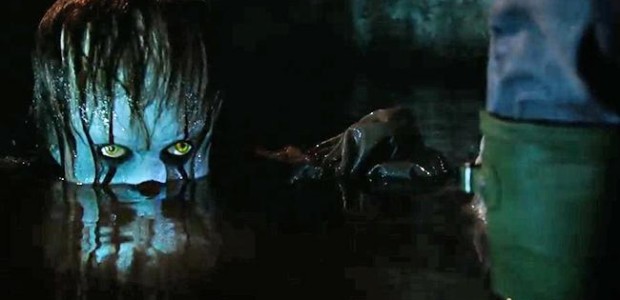“You’re that geeky Stephen King kid — there’s one of you in every school.”
— Delilah Profitt (Jordana Brewster), THE FACULTY
I was that geeky Stephen King kid in middle school, high school and pretty much now. I devoured every single one of his books from Needful Things to The Shining, but the one I never read was IT. Maybe it was the massive length that threw me off, maybe it was the miniseries being too ingrained in my brain, so much that I couldn’t delineate from it when reading the admittedly massive tome. I can’t say.
Whatever reasons for it, I finally bit the bullet and read IT in 2012 in the midst of a massive King read-through (fifteen King books including all of The Dark Tower, Under The Dome, AND The Stand). I loved the book and loved all of its meandering beauty. I grew to love the kids, fear the town and watch out for Mr Bob Gray, aka Pennywise the Dancing Clown. Odd things aside (the sewer thing) and being terrified of Patrick Hockstetter, the book is one of the great all-American novels in a bibliography of a writer who has many great all-American novels under his belt.
So finally all these years later, we have a filmic adaptation of the big book (so big that it actually fell on to a small dog and killed it. True story), and constant readers, it succeeded.
Andy Muschetti’s adaptation of Stephen King’s IT has released into theaters to unspool in front of eager, horror-hungry eyes. I have to tell you it’s one of the best films (horror or otherwise of the year — an unsettling off-kilter photograph of a movie, a film that perfectly hits all the pangs of nostalgia (childhood innocence, love, fear of the unknown and fear that your parents) and balancing it tightly with the horror of a predatory clown stalking you in the worst way possible. The film feels like a lost NIGHTMARE ON ELM STREET film, in the best way possible. It adapts the material cleverly, following the narrative path set forth by the book while simultaneously deviating off track to keep expectant audiences on their toes. If anything, the little Easter Eggs throughout kept me smiling (playing “Spot The Turtle” became a fun little game for me. For the record, I saw three turtle references), and the mere fact that all these things from King’s book are on screen for all to see is a blessed miracle.
The Lucky Seven (or The Loser’s Club) are the best realization of the character’s from King’s novel, since the miniseries (only minor weak spots in that cast), and they all have charm and charisma for miles, especially Sophia Lillis as Beverly. Just the way she talks with the boys in the club, her winking smiles beams forth with a million watts of light. From Jaeden Lieberher to Finn Wolfhard to Jack Dylan Grazer as Eddie, these kids steal every scene they’re in, and they’re nearly in every scene in the whole movie. One gets the sense that they’re real friends and will continue to be in the story and in real life. Muschetti picking these kids shows he’s an ace talent at casting. I walked out of the movie wishing they could be in every movie together. My fellow Daily Grindhouse colleague, Nathan Steinmetz, leaned over to me in the screening and whispered, “I love them all!” and he’s right. You will love them. I can’t express enough how brilliant they are. Even little creepy Georgie, played sweetly and sinisterly by Jackson Robert Scott will have you biting your nails one moment and weeping the next.
And what of Mr. Bob Gray, Pennywise the Dancing Clown? Bill Skarsgård makes the role his own. I wish there was more of him in the feature because there’s a rabid dog energy to his performance. The guy disappears underneath the makeup and takes an iconic role making it his own. I believe the writers wisely limited his appearances here, but I wish we could’ve seen him just a bit more, because his parts are the stuff of nightmares (the butcher shop scene, specifically).
Sure there were minor complaints I had like shifting Mike Hanlon’s story as the town historian (his whole big deal in the book was retelling the story of The Black Spot) and giving it over to Ben, which is fine, but it gives Mike in the film nothing more to do than be a teritiary character when he’s in essence the string that ties the Lucky Seven together in the book. It’s not a big thing in the grand scheme of things, but Chosen Jacobs is a good actor and deserves a little more meaty material (his history with Henry Bowers, the nasty powerful subplot in the book is absent here as well). I also had minor qualms with the CGI ( a necessity in this day and age and it allows for proper accentuation of Pennywise’s more toothier aspects), because it feels out of place in the perfectly retro 80’s world. Though they wisely sidestepped the insidious nastiness of Derry (the racism, the homophobia), the town itself was inherently evil and there could’ve been more of that. Still, it’s MINOR stuff and in no way ruins the film for you.
I loved the way Derry is set up to emulate the ’80s, because for people like myself, we grew up with IT in the 90’s and therefore our nostalgic impulses are more attuned to that particular decade whereas the miniseries and the novel were more for those that grew up in the 1950s, like King himself. The ’80s influence isn’t beaten over the audiences head either, it’s just there in the form of classic movie poster (love THE DREAM CHILD getting its moment of glory) or the soundtrack cues (The Cult, The Cure, XTC), but otherwise it fits the narrative of the piece rather than a cheap cash-in on an audience’s predisposition to love the 1980s.
IT is one of the best King adaptations ever. IT will be the gateway for a lot of young viewers like myself who watched the miniseries on November twenty-seven years ago, and it’s going to be a big hit for Warner Brothers (who also adapted one of the best King adaptations, let it be known). This is a call for horror studios now. Make your horror smart, make it for adults and kids alike, and let your filmmakers tell the story, even if it’s a little longer than the norm. It’ll be fine and it will pay off tremendously.
But the Internet is on its garbage again and acting up, so I have to give you a digital ink-splattered talking-to:
Andy Muschetti’s IT is fantastic, one of a kind stuff.
Tommy Lee Wallace’s IT is still fantastic and still memorable.
You can like both adaptations and it’ll be fine. I promise. Because they’re two different versions of a singular work, both with different scripts, different actors and made for different decades. You can say that Tim Curry’s performance as Pennywise is great without dismissing Bill Skarsgård’s equally chilling performance. I will say I like the kid actors in the film a lot better than the miniseries (but they’re still great). You can say that the miniseries is still fun without dismissing the movie, or vice-versa. It doesn’t have to be either/or. It can be two things and it is. So suck it up, go see one of the best King movies ever and be happy that we’re getting horror and BIG horror in this world. Sure both versions have their weak elements, but what adaptation doesn’t? It’s okay, you guys.
So what if a movie is wall-to-wall jump scares? A horror movie is a ride after all — its point is to exist and to scare you. It’s a roller coaster for those that don’t want to defy death that much.If it doesn’t adapt it perfectly, or do it how it was in your mind? Read the book. It’s still there.
Point is, if someone loves something, let them have that. Because they may hate something you like, and you wouldn’t want them to be a grouch about it, right? And if you hated the miniseries, read the book. If you hated the book, watch the movie or miniseries. There are three forms of ways you can consume Stephen King’s IT. So, you know, go do it.
Tags: Andrés Muschietti, Bill Skarsgård, Cary Fukunaga, Chase Palmer, Chosen Jacobs, clowns, Finn Wolfhard, Gary Dauberman, Horror, It, Jack Dylan Grazer, Jackson Robert Scott, Nicholas Hamilton, Sophia Lillis, Wyatt Oleff



No Comments